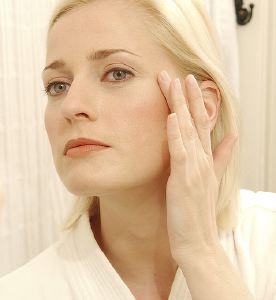Your Epidermis is Showing!

Your skin is your body's first line of defense from external injury. It protects you from infectious organisms and environmental stresses, and helps you maintain your body temperature. An average adult's skin weighs about 9 pounds, and has a surface area of around 20 square feet, making the skin the body's largest organ.
![[skin graphic]](/sites/default/files/skin.jpg)
The skin has three major layers--the epidermis, the dermis and the subcutaneous fat layer. Keratinocytes, which are produced at the bottom layer of the epidermis, are the main epidermal cells. Over a period of about month, keratinocytes migrate to the outer epidermis, die, and are sloughed off.
The paper-thin epidermis has no blood supply, and it gets nutrients from the dermis, which lies directly beneath it. The dermis helps maintain body temperature. It also contains immune cells, and is important for determining the skin's elasticity.
A subcutaneous fat layer is found under the dermis. Sweat glands and hair follicles originate in the subcutaneous tissue. Sebaceous glands, which produce oil that lubricates the epidermis, are found at the base of each hair follicle.
Although your skin grows from the inside out, and the outer layer is composed of dead cells, you still need to care for your skin. Try to view your skin as a suit of armor, designed to protect you from the environment. Treat your skin right, and it will help to keep you healthy.

Exposure to water is a frequent cause of dry skin. Water removes the protective layer of oil that covers healthy skin, and excessive use of soap compounds this problem (more on soaps below). Long, hot baths, though they relax the body, are extremely drying to the skin. Dry skin can also result from exposure to the sun and to cold, dry air; this is why so many people have skin problems in the winter.
You can help prevent and treat dry skin by using protective lotions every day. Lotions help keep a layer of moisture next to the skin, and they work best when applied to damp skin. Ideally, lotions should be applied as soon as you get out of the bath or shower. Instead of drying off thoroughly, just blot excess moisture with a towel, then apply a layer of lotion or bath oil. Adding bath oil to the tub may be helpful, but it makes the tub very slippery, so take care to avoid falls if you do this.
There are many different lotions available to prevent and treat dry skin. How do you choose the right one? Although manufacturers want you to think otherwise, most people don't need to spend a lot of money on skin care products. A little experimentation can help you determine what works best for your skin without leaving your wallet empty.
It's usually unnecessary to purchase different lotions for different parts of your body. Some products, such as alpha hydroxy (AHA) lotions, are expensive. AHAs help peel flakes from the outer skin surface, making skin look healthier. If you like the way AHA products make your face look and feel, you may want to splurge and use them just on your face. And if oil-based lotions make your face break out, an oil-free preparation with dimethicone may be helpful for your facial skin.
Lotions contain two basic types of ingredients: humectants, which draw moisture to the skin's surface; and barrier-type ingredients that trap moisture on the outer skin. Common humectants include glycerin, propylene glycol, AHAs, urea and lactic acid.
Glycerin-containing products are generally less expensive than those with AHAs, urea, and lactic acid, so you may want to try glycerin products first. Urea and lactic acid are produced naturally by the body, are very effective at retaining moisture, and may be worth the investment if you have extremely dry skin.
![[crisco graphic]](/sites/default/files/crisco.gif)
Grandma's beauty secret? Probably not, but it'd work in a pinch.
Commercial skin preparations that form a moisture barrier typically contain petrolatum, mineral oil, lanolin or silicone derivatives. However, a thin layer of petroleum jelly, or even Crisco, applied to damp skin, is just as effective for this purpose as many of the costly skin preparations on the market. You probably don't want to coat yourself with Crisco, but do remember that expensive ingredients aren't necessarily better than cheaper alternatives.
What about those other ingredients in your lotion? Perfumes and botanical extracts may make a lotion smell nice, but they can cause allergic reactions in some people. Lanolin is also a common allergen found in lotions. If your skin itches or tingles after applying a lotion, you could be having a reaction to these chemicals, and may want to switch to a preparation with fewer additives. Skin that is extremely dry and cracked can actually become more irritated by lotions. Consult a dermatologist if skin irritation persists, or if your skin remains very dry, itchy, or flaky after several weeks of home treatment.
Consumers can purchase soaps that moisturize, deodorant soaps, antibacterial soaps, and soaps that come in funny shapes. Which type is best?
If you want to kill common household germs, all soaps are about equally effective. Soaps break up the outer membrane of household bacteria, and produce lather, which surrounds and isolates bacteria. If you lather thoroughly and rinse well, most of the germs on your hands are washed down the drain.
Antibacterial soaps containing triclosan became widely available in household cleaning products in 1995. Consumers now spend $1 billion each year on antibacterial soaps, and products containing triclosan are marketed to consumers as a means of preventing infections.
While triclosan does have antibacterial effects, the most common infections are actually caused by viruses, which are not killed by triclosan. Colds and influenza are spread through the air in sneezes and coughs. Unwashed hands can transfer the viruses to doorknobs and other environmental surfaces, where they may survive long enough to spread to other people.
Frequent, thorough hand washing can help limit the spread of these infections in the home. Antibacterial soaps, which are more drying to the skin than ordinary soaps, are not necessary for protection from typical household germs.
 Americans tend to be very fastidious (some might say obsessive) about bathing. Dry skin is also very common in the US. One reason for this is that daily bathing and head-to-toe lathering with harsh soaps is not good for the skin.
Americans tend to be very fastidious (some might say obsessive) about bathing. Dry skin is also very common in the US. One reason for this is that daily bathing and head-to-toe lathering with harsh soaps is not good for the skin.
Instead of scrubbing your whole body with a deodorant soap and washcloth, try using a gentle soap on the areas that need it most (the armpits, groin, and buttocks). Plain water is all that you need to clean most areas of your skin.
There are other things that you can do to protect your skin from dryness. During the cold, dry winter months, a humidifier can put moisture back into your home's air, and help prevent loss of moisture from your skin. If you have a lot of static electricity in your home, the humidity is probably too low. Shower most of the time, using warm water, instead of taking hot soaks in the bathtub. Proper diet and exercise, and drinking plenty of water help maintain healthy skin. Diuretics like caffeine and alcohol cause your body to lose water, so limiting your intake of these substances is also helpful. Finally, always wear a good sunscreen, even in the winter, to protect your skin from sun damage.
Kate Traynor is a fabulous medical writer babe and mother of two boys. Plus also she's a friend of Lynn. © 1999-2017 Kate Traynor, used by permission.
